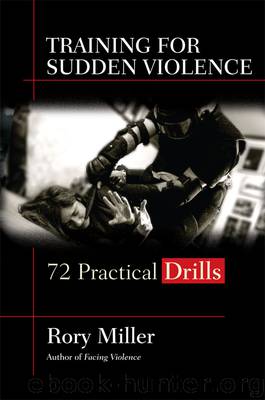Training for Sudden Violence by Rory Miller

Author:Rory Miller
Language: eng
Format: epub
ISBN: 9781594393815
Publisher: YMAA Publication Center, Inc.
Articulation
IW9
Making good decisions is often easier than explaining those decisions. This is especially true in a self-defense situation, where the decision and the action may be made in an instant, and you may need to explain, clearly and logically to police, prosecutors, and a jury, why you had no choice.
That takes practice, but there is more to it.
You make fast decisions all the time. Without reverting to conscious thought you subconsciously take in information, weigh options, and turn right rather than left, or slap your hand over the sudden leak in a hose.
Making rapid decisions is something you already do. Making good rapid decisions is also something you can do, but it takes practice and knowledge. You must have a background of information and experience to base your decisions on.
In a self-defense situation, you must understand self-defense law generally and your local jurisdiction’s laws in particular. You must read them yourself, and you must understand them. You need those facts in your head before your subconscious can make an informed decision.
Generally, if your ego doesn’t get involved, you will make good and justified self-defense decisions. Most of the people who claim they have been jailed for self-defense fully participated in bringing on the fight.
That may not matter, though, if you can’t explain the decision. “Self-defense” is an affirmative defense. It does not make the underlying crime disappear (e.g., if you have killed someone in self-defense, you have committed the crime of homicide, probably manslaughter). It justifies the crime. It explains it.
You must explain it.
You are unlikely ever to get in enough violent encounters that you can remember them clearly, much less describe them … and much less describe them in legalspeak:
After yelling “I’m going to kill you, motherfucker!” the threat then attempted to strike me with his right fist. Because of his size, youth, and strength, he was capable of doing considerable damage and showed intent (threat, attacking), means (size, strength, closed fist), and opportunity (he was well within reach) to be an immediate threat at an assaultive and possibly lethal level. That would have automatically justified focused blows and, given the strength disparity, an impact weapon. I judged that I could evade the blow and push the threat into the wall, which I did, handling the incident a full two levels of force below that which would have been authorized by policy and law.
You won’t have an opportunity to dissect many fights if you live a somewhat normal life, but you will have many opportunities to dissect subconscious, faster-than-thought decisions.
Do this: from this point forward, whenever you get a feeling or a hunch, if it is safe to stop and think, stop and think. “Where did that thought come from?”
Your brain processes huge amounts of information all the time. The stuff that makes it to your conscious awareness is a tiny piece and not necessarily the important stuff. Your intuition doesn’t trigger from some psychic power. You noticed something, it fit a pattern, and you drew a conclusion.
Figure it out.
Download
This site does not store any files on its server. We only index and link to content provided by other sites. Please contact the content providers to delete copyright contents if any and email us, we'll remove relevant links or contents immediately.
SAS Survival Handbook by John 'Lofty' Wiseman(2723)
Food and Water in an Emergency by Food & Water In An Emergency(2407)
Dangerous Personalities by Joe Navarro(2290)
Sea Survival Handbook by Keith Colwell(2246)
First Aid Handbook--Crucial Survival Skills, Emergency Procedures & Lifesaving Medical Information by Department of the Army(1839)
The Survival Medicine Handbook: A guide for when help is NOT on the way by Joseph Alton & Amy Alton(1835)
100 Skills You'll Need for the End of the World (as We Know It) by Ana Maria Spagna(1705)
The Survival Savvy Family by Julie Sczerbinski(1694)
TWA 800 by Jack Cashill(1654)
Sheep No More by Jonathan T. Gilliam(1641)
Prepper's Survival Medicine Handbook: A Lifesaving Collection of Emergency Procedures from U.S. Army Field Manuals by Scott Finazzo(1614)
Spy Secrets That Can Save Your Life: A Former CIA Officer Reveals Safety and Survival Techniques to Keep You and Your Family Protected by Jason Hanson(1606)
The Complete U.S. Army Survival Guide to Foraging Skills, Tactics, and Techniques by Jay McCullough(1535)
The Natural First Aid Handbook by Brigitte Mars(1464)
The Emergency Survival Manual by Joseph Pred(1460)
Be a Hero by John Geddes(1428)
Joey Green's Magic Health Remedies by Joey Green(1360)
The Zombie Survival Guide by Max Brooks(1349)
Poisoned by Jeff Benedict(1316)
